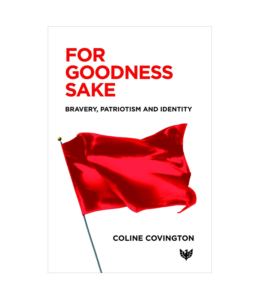
Coline Covington, PhD, BPC is a Training Analyst of the Society of Analytical Psychology and the British Psychotherapy Foundation and former Chair of the British Psychoanalytic Council. She is a Fellow of International Dialogue Initiative (IDI), a think tank formed by Professor Vamık Volkan, Lord Alderdice, and Dr Robi Friedman to apply psychoanalytic concepts in resolving political conflict. From 2011 to 2013, she was Visiting Research Fellow in International Politics and Development at the Open University and Senior Scholar at the Woodrow Wilson International Center for Scholars in Washington, DC.
Here she reflects on the effects of the global pandemic and its relevance to her new work For Goodness Sake: Bravery, Patriotism and Identity

As Covid-19 sweeps across the globe, threatening lives in every country, regardless of race, wealth or politics, we see borders hardening and a further retrenchment into nationalism as self-defence becomes our paramount concern. On an international scale, xenophobia escalates with fingers pointed at the Chinese as the source of coronavirus. In those places where self-isolation is the local form of protection, every neighbour is the “other”, the potential harbinger of death.
At the same time, collaborating with others, whether it is on a local or international level, has never been so important for our collective survival. As countries struggle to fight this new plague and to save their citizens and their economies, our need for help from our neighbours becomes even more urgent, whether it is in the form of medical equipment, scientific knowledge, trade supplies or financial assistance.
Our patriotic values, our beliefs about our responsibility towards others and what it means to belong to a country and to be a “good” citizen in times of crisis, upholding our country’s values while respecting the values of others, are being challenged on a global scale, beyond even the wartime experiences of our pasts. It is a time of re-evaluation of both our personal and our political values – the markers of our identity and our morality.
Amidst this crisis, and in the ever-present shadow of climate warming, we need courage to bear our losses and to face the changes that lie ahead.
This is a time of bravery and of being true to oneself. Every act of bravery is an act of self-agency and, as such, a political act. When we defend someone else’s life, we are defending our own and, more importantly, we are defending what Camus describes in his novel, The Plague, as “decency”. Camus stresses that resistance to destructiveness, in this case the plague, is not to do with heroism, it is to do with decency, with our responsibility towards one another and towards ourselves to preserve “goodness” in life. It is this responsibility that binds us together in our beliefs, in our belonging, and in our patriotism; it is our belief in “goodness” that shapes our identity, that guides our action, and gives voice to our dissent.
The act of bravery affirms that the other exists and matters – that our identification with one another gives us collective meaning and a sense of self. In contrast are the explanations of those who have failed to be brave, “I didn’t want to get involved because it wasn’t anything to do with me,” or “I could have done something, but it wouldn’t have made any difference in the long run and it would have been risky for me in any case,” or “They’re not like us, so why should we risk our lives for them?” We can see in these explanations the psychological defences of denial, disavowal and splitting. These are the defences that alienate us from ourselves and from our connection to others and allow injustice and dehumanization to occur.
The Chinese doctors who first alerted the world to the deadliness of Covid-19, and were subsequently imprisoned for speaking out, are an example of the “decency” that outweighs individual well-being in the service of being true to oneself. This is but one of many examples of those who are bravely risking their lives to help others in this pandemic.
The plague takes many forms and appears when least expected. When we have overcome Covid-19, we will be living in a world that has been traumatized, and in some ways irretrievably damaged. This may be a time when, out of existential fear and overwhelming loss, populations seek security in strong leaders and the autocracies that have risen to power around the world are strengthened. But it may also lead to a transformation of global politics as we become acutely aware of our need for one another. Like the Phoenix, the ashes of the destruction wrought by this invisible enemy may bring forth new political alliances and new forms of international cooperation.
We can only hope, with Camus, that our “decency” will give us the courage we need to preserve what is most important to us and future generations.
Coline Covington

